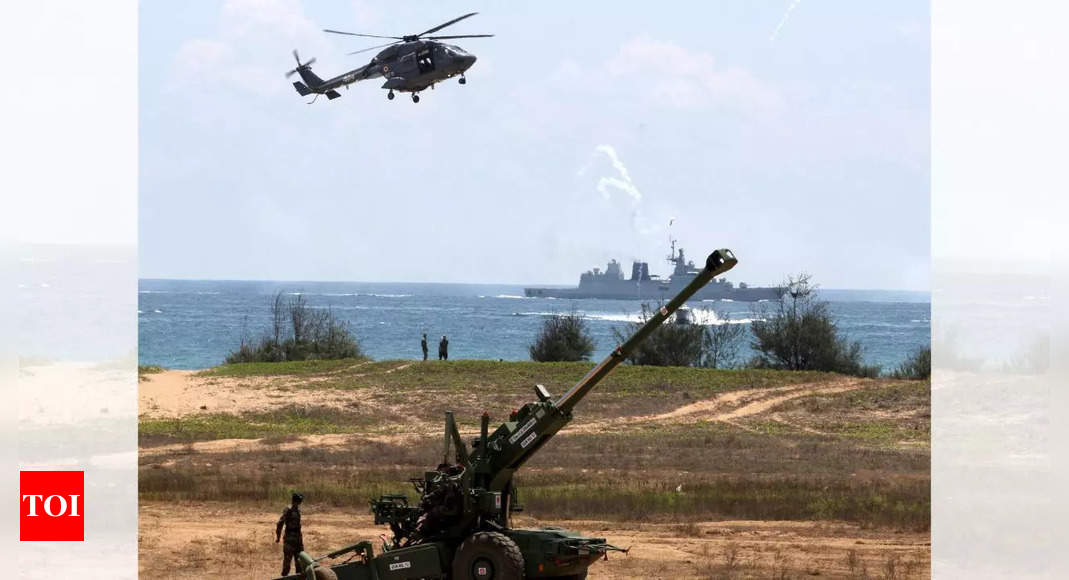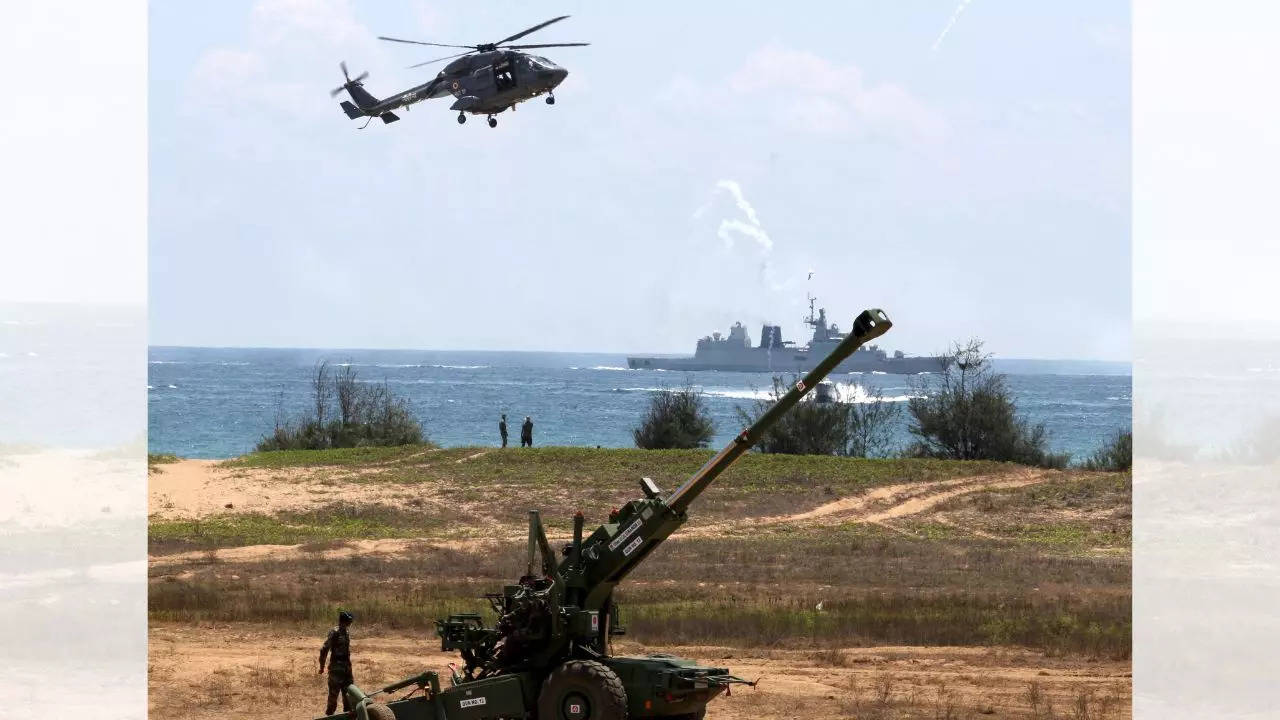[ad_1]
NEW DELHI: The impending creation of joint theatre commands will combine the unique capabilities of the Army, Navy and IAF through integrated processes and structures to bolster the country’s war-fighting capacity, chief of defence staff General Anil Chauhan said on Friday.
‘Theaterisation’ is a fundamental change in the national security realm that is on the anvil, and it will help the country effectively tackle the entire spectrum of conflict, Gen Chauhan said, inaugurating the annual DRDO Directors’ Conclave here.
“It is one of the most ambitious changes with far reaching implications attempted post-Independence. The start on this journey depends on the right steps being taken first towards jointness and integration. Theaterisation involves creation of tri-Service theatre specific structures for effective response along the entire spectrum of conflict,” he said.Noting that international geopolitics is in a state of flux, the CDS said the national security strategy should aim to absorb the changes in such a way that it meets the challenges and exploits the opportunities. He stressed the need to “perform, reform, transform, inform and conform” to meet the emerging challenges.
With superiority in technology and tactics being the need of the hour, the armed forces are investing in new technologies to win engagements, and the ongoing integration in the physical domain aims to achieve “a multiplier effect”, Gen Chauhan said.
TOI was the first to report last month that India was once again resolutely working towards the creation of theatre commands – which stalled after the first CDS Gen Bipin Rawat’s death in a helicopter crash in December 2021 — after achieving a “consensus” among the Army, Navy and IAF.
With the original plan being tweaked to address all concerns in what will be the most radical military reorganization since Independence, the groundwork is underway for three such joint commands. The first two will be “adversary-specific” — one for the northern borders with China and the other for the western front with Pakistan. Then there will be the Maritime Theatre Command (MTC) for the Indian Ocean Region as well as the larger Indo-Pacific.
While the theatre commands will take some time to take their full shape, their forthcoming creation could be announced as early as August 15. The headquarters of the Integrated Theatre Command (West) will be at Jaipur, which currently has the Army’s South-Western Command. The Integrated Theatre Command (North), in turn, will be at Lucknow, which has the Army’s Central Command.
The MTC will be headquartered at Karwar in coastal Karnataka. The already huge strategic naval base at Karwar is being further expanded under Project Seabird, with the aim to make it the largest such facility in Asia.
Once the theatre commands are in place, they will take over the “operational role” of the single-Service commands under them. At present, India has as many as 17 single-Service commands (Army 7, IAF 7 and Navy 3), which have very little synergy in planning, logistics and operations.
Initially, the theatre commands are likely to be headed by senior three-star generals (Lt-Generals, Air Marshals or Vice Admirals), with their age of retirement being extended to 61 from the existing 60. But eventually four-star generals of the same rank as the Service chiefs will head the joint commands.
India currently has only two unified commands, the geographical Andaman and Nicobar Command and the functional Strategic Forces Command to handle the country’s nuclear arsenal, which were set up in 2001 and 2003 after the Kargil conflict with Pakistan.
China, incidentally, re-organised its 2.3-million People’s Liberation Army into five theatre commands in early-2016 to boost offensive capabilities and establish better command-and-control structures. Its Western Theatre Command, for instance, handles the entire 3,488-km Line of Actual Control from eastern Ladakh to Arunachal Pradesh. India, in contrast, has four Army and three IAF commands for the northern borders with China.
‘Theaterisation’ is a fundamental change in the national security realm that is on the anvil, and it will help the country effectively tackle the entire spectrum of conflict, Gen Chauhan said, inaugurating the annual DRDO Directors’ Conclave here.
“It is one of the most ambitious changes with far reaching implications attempted post-Independence. The start on this journey depends on the right steps being taken first towards jointness and integration. Theaterisation involves creation of tri-Service theatre specific structures for effective response along the entire spectrum of conflict,” he said.Noting that international geopolitics is in a state of flux, the CDS said the national security strategy should aim to absorb the changes in such a way that it meets the challenges and exploits the opportunities. He stressed the need to “perform, reform, transform, inform and conform” to meet the emerging challenges.
With superiority in technology and tactics being the need of the hour, the armed forces are investing in new technologies to win engagements, and the ongoing integration in the physical domain aims to achieve “a multiplier effect”, Gen Chauhan said.
TOI was the first to report last month that India was once again resolutely working towards the creation of theatre commands – which stalled after the first CDS Gen Bipin Rawat’s death in a helicopter crash in December 2021 — after achieving a “consensus” among the Army, Navy and IAF.
With the original plan being tweaked to address all concerns in what will be the most radical military reorganization since Independence, the groundwork is underway for three such joint commands. The first two will be “adversary-specific” — one for the northern borders with China and the other for the western front with Pakistan. Then there will be the Maritime Theatre Command (MTC) for the Indian Ocean Region as well as the larger Indo-Pacific.
While the theatre commands will take some time to take their full shape, their forthcoming creation could be announced as early as August 15. The headquarters of the Integrated Theatre Command (West) will be at Jaipur, which currently has the Army’s South-Western Command. The Integrated Theatre Command (North), in turn, will be at Lucknow, which has the Army’s Central Command.
The MTC will be headquartered at Karwar in coastal Karnataka. The already huge strategic naval base at Karwar is being further expanded under Project Seabird, with the aim to make it the largest such facility in Asia.
Once the theatre commands are in place, they will take over the “operational role” of the single-Service commands under them. At present, India has as many as 17 single-Service commands (Army 7, IAF 7 and Navy 3), which have very little synergy in planning, logistics and operations.
Initially, the theatre commands are likely to be headed by senior three-star generals (Lt-Generals, Air Marshals or Vice Admirals), with their age of retirement being extended to 61 from the existing 60. But eventually four-star generals of the same rank as the Service chiefs will head the joint commands.
India currently has only two unified commands, the geographical Andaman and Nicobar Command and the functional Strategic Forces Command to handle the country’s nuclear arsenal, which were set up in 2001 and 2003 after the Kargil conflict with Pakistan.
China, incidentally, re-organised its 2.3-million People’s Liberation Army into five theatre commands in early-2016 to boost offensive capabilities and establish better command-and-control structures. Its Western Theatre Command, for instance, handles the entire 3,488-km Line of Actual Control from eastern Ladakh to Arunachal Pradesh. India, in contrast, has four Army and three IAF commands for the northern borders with China.
[ad_2]
Source link











More Stories
We can’t wait to face India in the final: Pat Cummins | Cricket News
Railways plans 3,000 additional trains in next 4-5 years to minimise number of waitlisted tickets | India News
Faridabad: Man dies after ‘falling from hotel room window’ while partying with friends